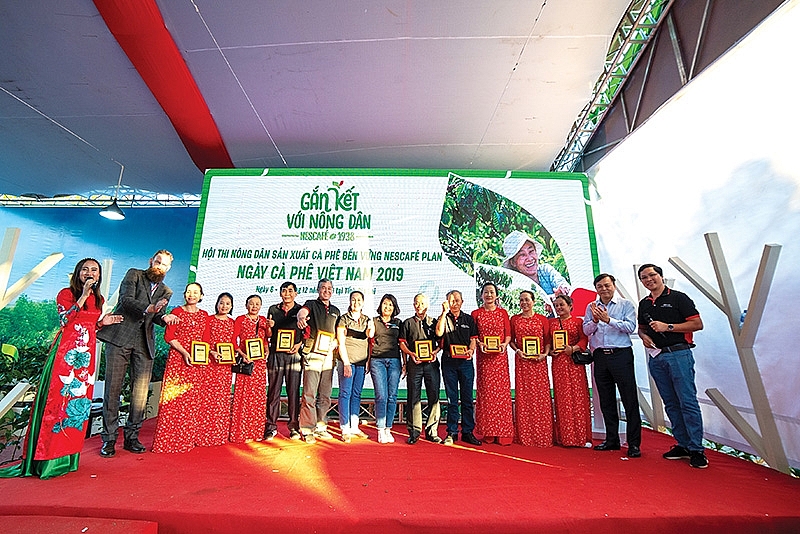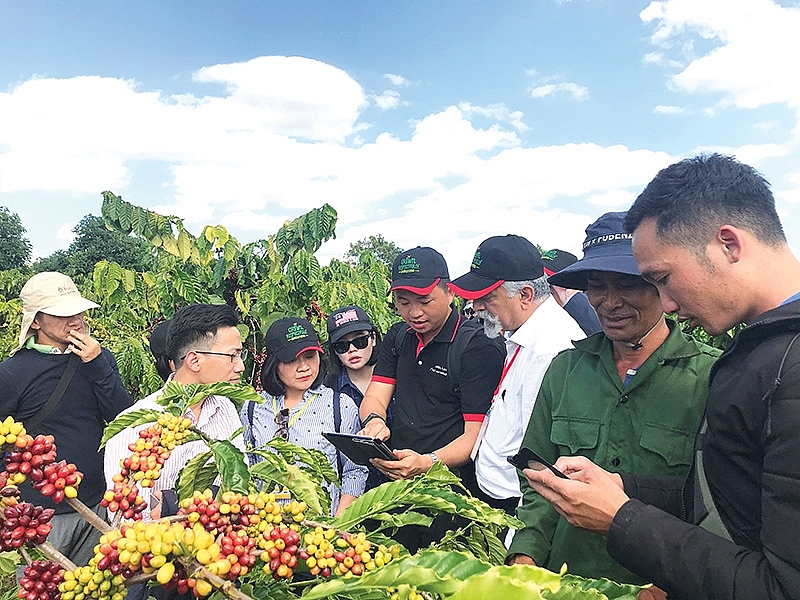Nestlé creating blueprint for quality coffee development
 |
| Vietnam Coffee Day 2019 was a special day not only for consumers but also companies that wish to promote production advances |
Despite being the world’s largest robusta coffee nation, Vietnamese coffee is facing several problems that cast adverse impacts on the segment’s long-term development. The quality of Vietnamese coffee is still limited as most coffee farmers plant and harvest by following traditional methods without the application of modern science and technology. Also, ageing coffee areas have also affected coffee output and quality.
In 2010, the Nescafé Plan was launched by Nestlé. It has been proactive in presenting solutions as well as deploying concrete activities to support the sustainable development of the Vietnamese coffee industry. After a nearly a decade, the plan has made significant contributions towards developing Vietnam’s coffee sector towards self-sufficiency in coffee and improved chain links, as well as raising the value of Vietnamese coffee beans. Together with Brazil, the Nescafé Plan in Vietnam has been reaping great successes.
 |
| Tablets are used to introduce farming technology and synchronise farms with the Nescafé Plan |
Today, Nestlé has distributed 36 million high-yielding and disease-resistant coffee plantlets to farmers in four provinces of the Central Highlands. The initiative has also helped the government in a re-farming programme to rejuvenate over 36,000 hectares of aged coffee areas, and conducted over 230,000 training sessions on best practices, which equip them with useful techniques to improve the bean quality and sustainable farming.
In addition, Nestlé is assisting over 21,000 farmers to acquire international certificates and increase their income by 30 per cent using Nescafé Plan techniques. The plan helps protect the natural environment through reducing irrigated water usage by 40 per cent and chemical fertiliser and pesticide use by 20 per cent. Furthermore, Nestlé provides more immediate economic advantages to farmers by buying coffee beans from them with an annual value up to $700 million.
Speaking at Vietnam Coffee Day in October, Luong Van Tu, chairman of the Vietnam Cocoa Coffee Association lauded the Nescafé Plan, saying it strengthens sustainability and advances the economic benefits of coffee farming in Vietnam. “The Nescafé Plan not only supports Vietnamese coffee farmers in volatile times, but also improves coffee farm yields up to 4.5 to 5 tonnes per hectare, almost double the national average yield of 2.6 tonnes per hectare,” Tu said. “The initiative has facilitated farmers to replant over 130,000 hectares of aging coffee trees, contributing to fulfilling the country’s coffee replanting targets.”
The Nescafé Plan has played a crucial role in public-private partnerships (PPP) for the coffee sector, an initiative under the World Economic Forum in collaboration with the Ministry of Agriculture and Rural Development, the Western Highlands Agriculture & Forestry Science Institute, and local agricultural extension centres in the Central Highlands since 2010.
By delivering positive outcomes, Nestlé Vietnam has been recognised by the Ministry of Agriculture and Rural Development for its important role in the development of the Vietnamese coffee industry. The company was awarded Certificates of Merit for its outstanding contributions to the Vietnam’s coffee industry and sustainable agricultural development under the PPP model.
Moving into the next decade, Nestlé looks to continue assisting Vietnamese farmers leverage digital technology to unlock agriculture potential. The group’s plan has unveiled the FARMS software application, managing data of each farm and connecting farmers with experts to get assistance in a timely manner. The software also includes a database of the best farming practices so that farmers can learn and apply them on their coffee farms.
Within the framework of Vietnam Coffee Day, Nestlé also organised a competition promoting sustainable coffee production among local farmers. The competition was one of the regular annual activities of the Nescafé Plan to create a level playing field where local farmers from diverse stakeholder locations can meet and exchange experiences and improve knowledge about sustainable agricultural practices.
Climate change, crop diseases, water shortages, and people leaving farms for cities all threaten the future of coffee. Nestlé Vietnam will continue its efforts to build respectful relationships with farmers through the Grown Respectfully programme. Grown Respectfully encapsulates the work Nestlé has been doing since 1938, to help farmers grow more and better coffee via the Nescafé Plan’s three pillars of respect for farmers, respect for communities, and respect for the planet.
| Will Mackereth - Supply chain director, Nestlé
The Nescafé Plan has been a worldwide initiative since 2010 that engages with the coffee farming community to ensure sustainability and create a good livelihood for farmers. The Nescafé Plan in Vietnam is one of our strongest initiatives across the world. We have distributed another nine million plants to Vietnamese farmers this year, taking the total number of delivered plants to 36 million since the initiative started began. We have also conducted more than 230,000 training sessions for nine years in Vietnam. Specifically, we help farmers reduce the cost of inputs through better management of water, agrochemicals, pesticides, and herbicides, as well as virtualising application to achieve cost effectiveness. The company also invests in plant development to ensure coffee plants deliver high yields as well as refresh and rejuvenate land and coffee farms. As a result, farmers can gain the best yields and crop returns on their farms in the future. They can also enjoy significant improvements in their livelihood thanks to cost savings. Furthermore, we support farmers in coffee intercropping with other products like peppers, avocados, and durian. In this way, they can become more resilient when coffee prices are low in volatile times. Farmers can still have good incomes from the product stream. We try to get the best returns for Vietnamese coffee beans to ensure sustainability in the long term. Accordingly, we do not just invest in branding and processing capacity in Vietnam, but also inform consumers about all the good things going on on the farms throughout the coffee supply chain. Thus, consumers can better connect with the concept of creating shared values that the Nescafé Plan represents. It is all about creating products that drive quality and good experience to consumers, but also create value for society. The same philosophy is applied through our supply chain, logistics, and factories with a view to achieving sustainable long-term growth. For example, we invest in vehicles that reach the highest environmental standards and fuel efficiency. In our factories, we make huge efforts to optimise energy usage by using coffee shells as fuel, utilising waste from the boiler and processing wastewater for watering, among others. We are proud of the work that the Nescafé Plan has put into Vietnam. We will continue our efforts to support Vietnamese farmers and raise value for Vietnamese coffee beans, thereby developing Vietnam’s coffee industry sustainability in the long run. |
What the stars mean:
★ Poor ★ ★ Promising ★★★ Good ★★★★ Very good ★★★★★ Exceptional
Related Contents
Latest News
More News
- Kurz Vietnam expands Gia Lai factory (February 27, 2026 | 16:37)
- SK Innovation-led consortium wins $2.3 billion LNG project in Nghe An (February 25, 2026 | 07:56)
- THACO opens $70 million manufacturing complex in Danang (February 25, 2026 | 07:54)
- Phu Quoc International Airport expansion approved to meet rising demand (February 24, 2026 | 10:00)
- Bac Giang International Logistics Centre faces land clearance barrier (February 24, 2026 | 08:00)
- Bright prospects abound in European investment (February 19, 2026 | 20:27)
- Internal strengths attest to commitment to progress (February 19, 2026 | 20:13)
- Vietnam, New Zealand seek level-up in ties (February 19, 2026 | 18:06)
- Untapped potential in relations with Indonesia (February 19, 2026 | 17:56)
- German strengths match Vietnamese aspirations (February 19, 2026 | 17:40)


 Tag:
Tag:



















 Mobile Version
Mobile Version